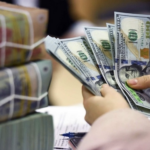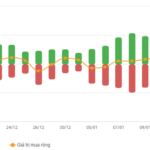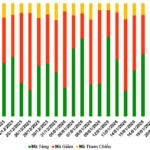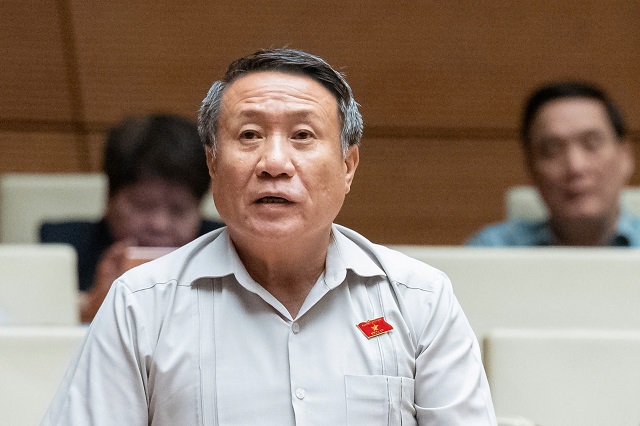
National Assembly Delegate Ha Sy Dong – Quang Tri Province Delegation
|
In his inquiry directed at the Governor, Delegate Ha Sy Dong raised the issue of coordination between fiscal and monetary policies. He pointed out that over the past year, more than VND 1 quadrillion of idle budget funds have been kept at the State Treasury. “How does the State Bank of Vietnam, the Ministry of Finance, and the State Treasury coordinate to redirect these idle funds and contribute to the optimal implementation of monetary policy?”
Governor Nguyen Thi Hong responded by explaining the role of the State Bank of Vietnam in providing services to the Government and managing the Government’s deposits. However, according to the Law on State Budget, budget funds are also allowed to be deposited in commercial banks within the credit institution system.
She revealed that idle budget funds kept at the State Treasury are mainly deposited in large commercial banks and have recently been transferred to the State Bank of Vietnam. “About 80% of the VND 1 quadrillion is now deposited with the State Bank,” the Governor shared.
Nevertheless, she acknowledged that depositing idle budget funds in commercial banks could have a certain impact on monetary policy and the liquidity of the banking system. Therefore, the State Bank of Vietnam and the Ministry of Finance have established a coordination regulation, exchanged information, and actively regulated monetary policies.
Drawing from the experiences of other countries, Governor Hong explained that transferring budget deposits to the State Bank is a solution implemented when inflation rises excessively, requiring funds to be pulled back to the central bank. In normal conditions, the opposite approach is taken.
Currently, credit institutions are not allowed to use these funds for lending, but they can use them indirectly to support their liquidity management. To mitigate risks, Governor Nguyen Thi Hong assured that the authorities are closely monitoring the situation, coordinating with relevant agencies, and requiring credit institutions to maintain a reasonable capital balance to ensure safe capital adequacy.
‘Interest rates have decreased significantly compared to other countries’
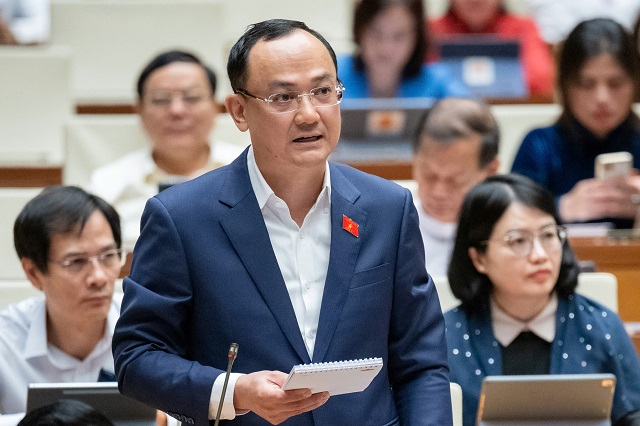 Delegate Nguyen Ngoc Son – Hai Duong Province Delegation
|
Delegate Nguyen Ngoc Son inquired about the possibility of further interest rate reductions and the implementation of policies to adjust foreign exchange reserves to stabilize exchange rates.
Governor Nguyen Thi Hong responded by outlining the primary objective of monetary policy, which is to contribute to controlling inflation, stabilizing the macro-economy, and ensuring the stability of the monetary and foreign exchange markets. She explained that the decision to reduce interest rates further depends on various factors, including domestic and global economic developments, liquidity, and the condition of the banking system.
“In the past, we have significantly reduced interest rates compared to other countries, and we will continue to monitor the situation,” said Mrs. Hong.
Regarding foreign exchange reserves, she emphasized three key principles: safety, liquidity, and profitability. She assured that the State Bank of Vietnam manages foreign exchange reserves with a focus on safety and liquidity, and they will strategically invest these reserves to maximize benefits for the country.
Small and medium-sized enterprises still face challenges in accessing credit
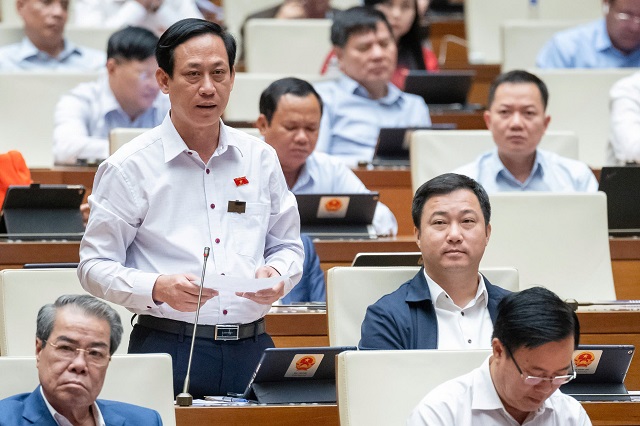 Delegate Mai Van Hai – Thanh Hoa Province Delegation
|
Delegate Mai Van Hai (Vice-Head of Thanh Hoa Province Delegation) brought up a “not-so-new” issue that voters are concerned about: the predominance of small and medium-sized enterprises in Vietnam. He requested that the Governor propose fundamental solutions to enhance the access to credit for enterprises and cooperatives.
In her response, the Governor acknowledged the challenges faced in implementing credit policies and shared that Governors often receive feedback regarding access to credit. According to the Ministry of Planning and Investment, there are over 900,000 enterprises in the country, with 97-98% being small and medium-sized enterprises. Consequently, Vietnamese businesses face limitations in terms of financial capacity, competitiveness, branding, and reputation.
Many small and medium-sized enterprises lack the capacity to repay loans and do not have feasible projects to access credit. The Government, understanding these challenges, has enacted laws and decrees to support small and medium-sized businesses in various aspects, including the market, legal framework, and product development.
To address this issue, the Government has established a support fund for the development of small and medium-sized enterprises, but its chartered capital is only VND 2,000 billion, a relatively small amount. The total outstanding debt of the entire system reaches VND 15,000,000 billion, of which enterprises account for VND 7,000-8,000 billion. In practice, this fund can provide direct or indirect loans, but the staff lacks experience in direct lending, so they have entrusted credit institutions to carry out this task.
Regarding the Enterprise Credit Guarantee Fund, Mrs. Hong shared that localities are implementing this fund with a chartered capital of only VND 100 billion. Many localities have not been able to allocate funds, and five funds have been dissolved. Several funds require enterprises to have collateral, which makes it difficult for struggling businesses to access them. “The State Bank of Vietnam has proposed the need to evaluate and identify key enterprises or satellite enterprises to provide appropriate support policies,” she added.
“Vietnam: A Captivating Destination for Global Investment”
With a thriving economy, robust macroeconomic stability, and a strong focus on infrastructure investment and administrative reform, Vietnam is solidifying its position as a highly attractive destination for global investment capital.
The Currency Financial Market Stability
According to a report by the Ministry of Planning and Investment, the economy in October and the ten-month period showed a strong recovery despite ongoing challenges and difficulties. Economic and social activities rebounded quickly after natural disasters and floods. In October, several international organizations upgraded their growth forecasts for Vietnam in 2024, predicting it could be the highest among ASEAN+3.
The Golden Opportunity: Unveiling the Latest SJC Gold Prices and Beyond
On the morning of November 9, gold businesses lowered their selling prices while maintaining the same buying prices as the previous day’s close.




